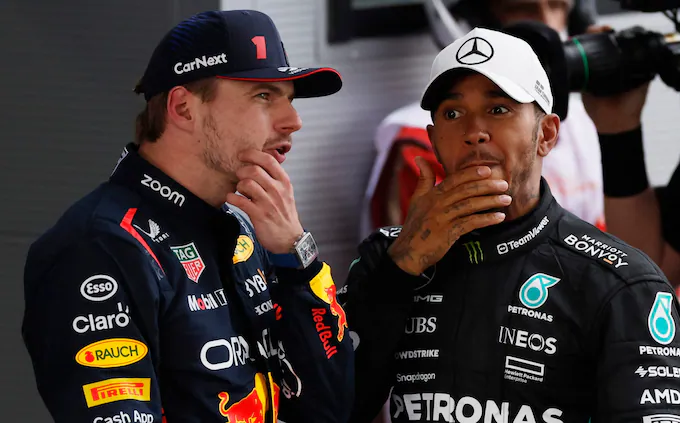
In a groundbreaking move that has sent shockwaves through the world of Formula 1, both Lewis Hamilton and Max Verstappen, two of the sport’s most iconic figures, have expressed their astonishment at the latest international development unveiled by the FIA (Fédération Internationale de l’Automobile).

The world of Formula 1 is no stranger to dramatic changes, but the latest announcement from the FIA is set to redefine the sport’s landscape on an international scale. According to official sources, the governing body has revealed plans to expand the F1 calendar to include a series of new races in previously uncharted territories. This ambitious strategy is aimed at capturing fresh markets and enhancing the global appeal of the sport, bringing high-octane action to fans in regions that have been starved of live F1 experiences.
The new plan will see F1 races being held in locations like South America, Southeast Asia, and Africa, with countries like Colombia, Vietnam, and South Africa now in the mix. This expansion is a bold attempt to diversify the fan base and tap into markets that have shown burgeoning interest in motorsport.
Lewis Hamilton, the seven-time world champion known for his activism and commitment to broadening F1’s reach, expressed mixed feelings about the news. “I’m excited to see Formula 1 embrace new cultures and new fans,” said Hamilton. “But we need to ensure that the sustainability goals we’ve set are not compromised by these expansions. It’s fantastic to see the sport grow, but we have to make sure we’re not growing at the expense of our planet.”
Hamilton’s cautionary stance is understandable, given his long-standing advocacy for environmental and social justice issues. As someone who has often voiced concerns about the environmental footprint of the sport, he called for a balanced approach that integrates both growth and sustainability.
Max Verstappen, the reigning world champion and Hamilton’s fierce on-track rival, was equally taken aback by the announcement. “It’s definitely surprising,” Verstappen stated. “We’ve been racing in similar regions for decades, and now suddenly, we’re looking at racing in places we’ve never been before. It’s exciting, yes, but it also comes with challenges, like adjusting to new circuits and climates. I hope it brings the same thrill and passion we see in Europe or North America.”
Verstappen’s reaction reflects the sentiment of many drivers who face the daunting task of adapting to unfamiliar tracks and conditions. The Red Bull driver also hinted at the potential logistical difficulties teams might face, such as increased travel and the need for more extensive planning.
The FIA’s decision has sparked a debate among F1 pundits, fans, and stakeholders. On one hand, this expansion can be seen as a strategic move to stay ahead of the curve in a rapidly globalizing sports market. On the other, it raises concerns about logistical challenges, environmental impacts, and the potential dilution of F1’s heritage.
The move also has a significant financial aspect. Expanding into new territories could bring lucrative sponsorship deals and a fresh wave of merchandise sales, creating a new revenue stream for teams and organizers. However, this financial upside is tempered by the massive logistical challenges that come with transporting teams, equipment, and staff to remote locations.
Despite the mixed reactions, there is no denying that Formula 1 is embarking on a bold journey to transform itself into a truly global sport. By venturing into new markets, the FIA hopes to introduce millions of new fans to the thrill of F1 racing, which has been traditionally centered around Europe and North America.
For the fans, this news could mean more thrilling races, unexpected winners, and perhaps the birth of a new generation of F1 legends from parts of the world that have been underrepresented in the sport’s history. As Formula 1 prepares to chart a new course, all eyes will be on how well it navigates this uncharted territory.
Hamilton and Verstappen, along with the rest of the F1 community, will be closely watching how these developments unfold, as the sport takes yet another significant step into the future.
Leave a Reply